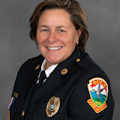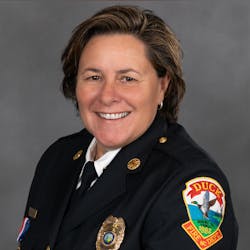In 1736, when Benjamin Franklin co-founded the Union Fire Company, it probably was much easier to entice citizens to volunteer for one specific mission—put water on the fire—and to stick with it. Fast forward almost 300 years and the proposition is a little more complicated.
With 67 percent of firefighters being volunteer, a consistent and stressful conversation occurs across the country about the effects that volunteerism has on departments. What the prominent issue is depends on the department or jurisdiction, but it most likely focuses on one of the following: concerns about the number of volunteers, training requirements, availability for response and training, changing service demands beyond firefighting (most notably, medical) and, of course, funding. Today’s number of classes, presentations and discussions about recruitment and retention rival the number of those that pertain to tactics and strategies. We face the uneasy question of “Can we still be a volunteer fire department?” We face the fear of what it means if we can’t.
Tradition means everything, and care for community extends beyond fire safety into community service. As an historically prideful bunch, we don’t want to express weakness or failure to our community, because it’s our friends and family who we serve to protect.
We must lean on each other to find ways to sustain the volunteer fire service. We also must acknowledge when it’s time to embrace a new way of providing for the community. It isn’t a failure; it’s a shift. How do we flush out if today’s volunteer departments have issues that affect our volunteer firefighters’ safety or that result in less effective deployment?
Situational awareness
Operationally, those who are in the fire service understand the importance of situational awareness. It guides us in tactical decision-making, safeguards our personnel and facilitates improving an incident. Where we tend to be less aware, however, is in nonemergency situations. Changes in the environment in the firehouse, a change in community sentiment about the fire department or public safety, and/or regional, national or global changes require our attention, too. In an effort to maintain firehouse operations as well as to attend to personal obligations, we might miss the once subtle change until it presents as a major change from the “normal.” What might have been an easy fix in the past now seems insurmountable.
You must have the difficult conversations, which involve assessing internally where you are as an organization.
Emotions, reactions and skewed perceptions often impede dealing in reality. Seek input from your personnel and review your core mission and the expectations that are set forth from the community that you serve—and, yes, look at the data. Bring the issue into focus by examining call volume, type and time; response; personnel; training; and your community demographics. We are instinctive beings by nature. Trust your gut and look at the objective measures. If you identify an issue, that’s the starting point for the solution.
All that said, do you even have a problem? Just because your peers in other agencies might be struggling and it’s talked about doesn’t mean that you are, too. Is there an immediate issue, long-term issue or no issue at all?
Citizen awareness
We assume that our citizens know what we do. TV shows depict skills and situations, but we know that there’s much more to it.
Do your citizens know whether the firefighters who show up to their emergency are paid or volunteer?
Think about how many people actually call for our services. Citizens are reminded during times of crisis—a fire or medical emergency, a weather disaster, an unthinkable violent incident—of the precious resource and specialized capabilities. Awareness creates interest in what we do as well as an understanding of what’s needed to be successful.
Volunteer or career, we are 1,115,000 strong. All firefighters deserve to be recognized and understood in their community for what they provide.
Perception is reality
If what they say is true—that perception is reality—then we must understand how this can be both helpful and a hindrance for public safety. For example, although the mere presence of a fire engine might bring peace of mind to some, unrealistic expectations regarding response time could call into question an agency’s capabilities.
Educating our stakeholders about our capabilities and capacity must be a priority. The time and energy that’s required for this education is far better than assuming that citizens understand how and what our departments accomplish. We all must make more of an effort to illustrate what it takes for a department to deploy and not be afraid to say when we need more help or resources. The responsibility rests with us to keep citizens informed about our operations, because this lays the necessary foundation for consideration of requests for apparatus, equipment, stations or staffing.
Use our resources
I personally have gained the most from engaging with my colleagues and mentors for guidance and validation. There also are organizations available for education and support. Some of those resources are the International Association of Fire Chiefs’ Volunteer and Combination Officers Section and its Volunteer Workforce Solutions; the National Volunteer Fire Council; the National Fire Academy; and individual state associations.
Honor and tradition are foundational, not fixed. They are the platform from which we serve our communities as well as the platform from which we make change. Our ability as fire chiefs to assess our organizations, educate our stakeholders, and collaborate with our colleagues and community partners helps us to sustain and, if necessary, reimagine the volunteer fire service, to provide a safe, effective and relevant community service. Acknowledging that we must embrace a new way of providing for the community isn’t a failure. It’s successful adaptation.
About the Author

Donna Black
Donna Black is the fire chief of the Duck, NC, Fire Department. She has served in the fire service for 25 years. Black led the transition of an all-volunteer department to its current operation as a thriving career/volunteer combination department. She also serves as the first vice president of the International Association of Fire Chiefs. Black holds a bachelor’s degree from Ithaca College and a master’s degree from the University of Georgia. She is a graduate of the National Fire Academy’s Executive Fire Officer Program and holds a post-graduate certificate in community preparedness and disaster management from the University of North Carolina at Chapel Hill as well as the Chief Fire Officer Designation (CFO).
